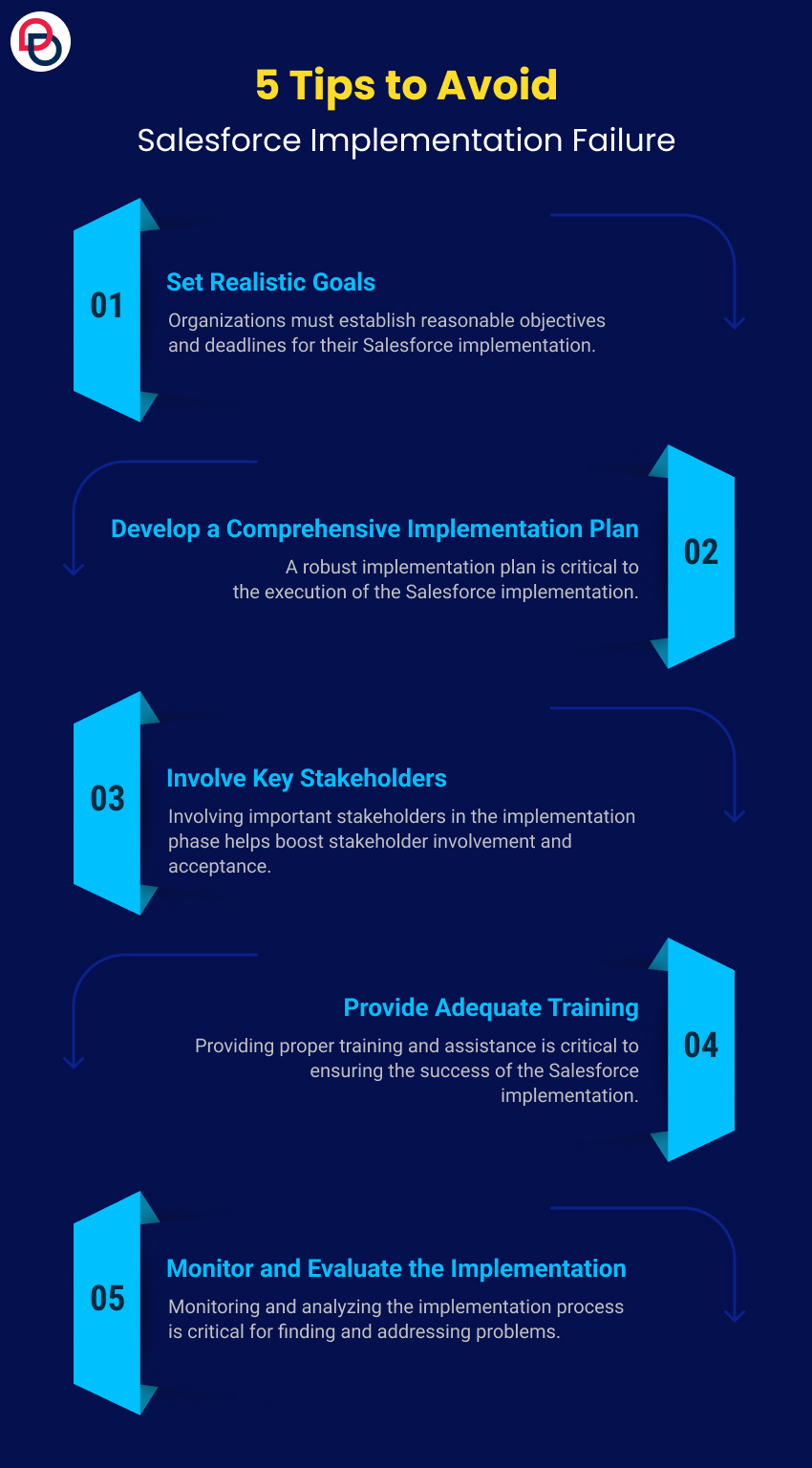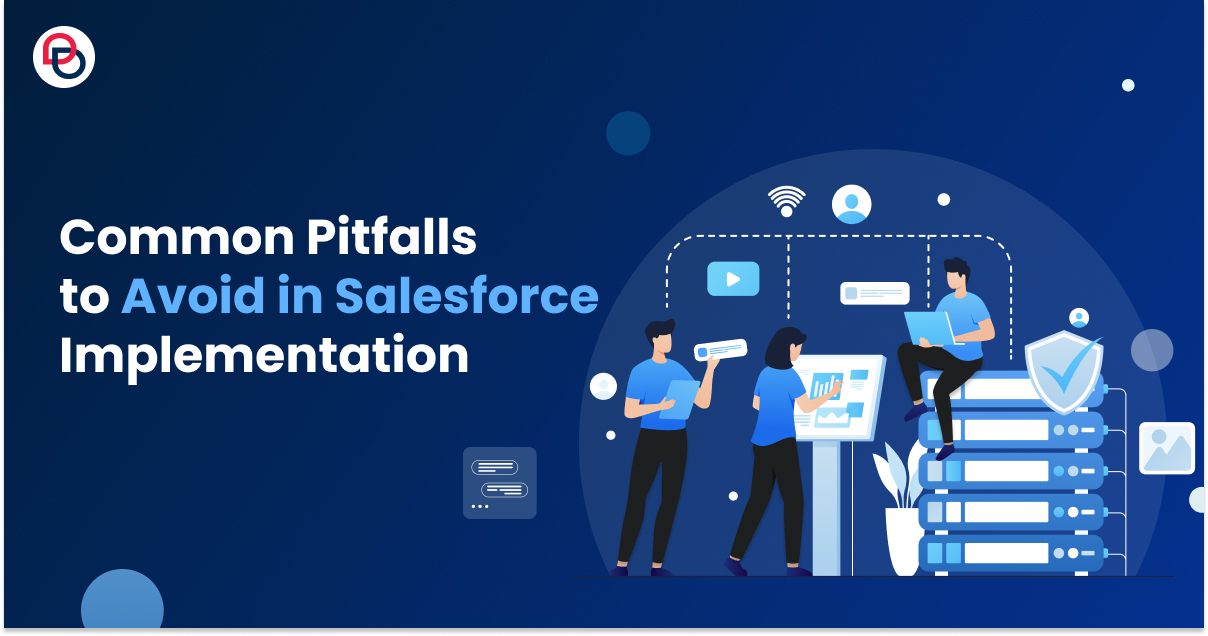Common Pitfalls to Avoid in Salesforce Implementation
In today’s digitally driven business landscape, implementing a robust Customer Relationship Management (CRM) system like Salesforce has become imperative for companies aiming to streamline their operations, enhance customer experiences, and drive growth. However, the journey towards successful Salesforce implementation is often riddled with challenges and pitfalls that can derail even the most well-intentioned efforts.
In this blog, we’ll explore some of the common pitfalls to avoid in Salesforce implementation, empowering businesses to navigate the Salesforce domain with confidence.
Understanding Salesforce Implementation
Salesforce is much more than just a CRM platform; it’s a powerful ecosystem that offers a plethora of tools and functionalities designed to cater to diverse business needs. However, harnessing the full potential of Salesforce requires careful planning, strategic execution, and ongoing optimization. Whether you’re embarking on your first Salesforce implementation or seeking to enhance an existing setup, steering clear of common pitfalls is crucial for maximizing ROI and achieving sustainable success.
So, what are the common pitfalls in Salesforce implementation?
Pitfall 1: Underestimating the Complexity
One of the most common pitfalls in Salesforce implementation is underestimating the complexity of the process. From configuring custom fields and workflows to integrating third-party applications and migrating data, numerous moving parts demand meticulous attention to detail. Many businesses make the mistake of assuming that Salesforce implementation is a straightforward task that can be accomplished quickly, only to find themselves grappling with unexpected challenges and delays. Look for Salesforce development services to implement Salesforce accurately in your business operations.
Pitfall 2: Lack of Clear Objectives and Requirements
Another critical pitfall is embarking on Salesforce implementation without clearly defined objectives and requirements. Without a comprehensive understanding of your business goals, processes, and user needs, it’s easy to veer off course and end up with a solution that fails to deliver meaningful value. Collaborating closely with stakeholders and leveraging the expertise of Salesforce consultants can help ensure alignment between business objectives and technical implementation.
Pitfall 3: Neglecting User Adoption and Training
No matter how technically sound your Salesforce implementation may be, its success ultimately hinges on user adoption. Neglecting to prioritize user training and adoption initiatives can lead to resistance, frustration, and ultimately, low utilization of the system. Investing in comprehensive training programs, user-friendly interfaces, and ongoing support is essential for fostering a culture of Salesforce adoption within your organization. You can contact Salesforce consultants to get rid of this pitfall easily!
Pitfall 4: Overlooking Data Quality and Migration
Data is the lifeblood of any CRM system, and ensuring its accuracy, completeness, and integrity is paramount. However, many organizations overlook the importance of data quality and migration in Salesforce implementation, leading to issues such as duplicate records, incomplete datasets, and data loss. Thorough data cleansing, mapping, and migration strategies are essential for maintaining data integrity and maximizing the value of your Salesforce instance.
Pitfall 5: Failure to Plan for Scalability and Customization
While out-of-the-box Salesforce functionality may suffice initially, businesses often encounter the need for scalability and customization as they grow and evolve. Failing to plan for future scalability and customization requirements can result in a solution that quickly becomes outdated and unable to accommodate changing business needs. Leveraging Salesforce development services and adopting a flexible, modular approach to customization can future-proof your Salesforce implementation and ensure long-term sustainability.
Pitfall 6: Ignoring Integration Challenges
In today’s interconnected digital ecosystem, seamless integration with other business systems and applications is essential for maximizing efficiency and productivity. However, integration challenges are a common pitfall in Salesforce implementation, particularly when dealing with legacy systems, disparate data sources, and complex workflows. Prioritizing integration planning, leveraging Salesforce APIs and middleware solutions, and collaborating with experienced integration specialists can help overcome these challenges and unlock the full potential of your Salesforce ecosystem.
Pitfall 7: Overlooking Change Management
Effective change management is often the linchpin of successful Salesforce implementation. Yet, many organizations overlook the human aspect of change, focusing solely on technical aspects and overlooking the impact on people, processes, and culture. Resistance to change, lack of communication, and inadequate stakeholder engagement can undermine even the most well-executed Salesforce implementation efforts. Investing in change management strategies, fostering open communication, and soliciting feedback from end-users is essential for driving adoption and mitigating resistance to change.
Tips to Avoid Salesforce Implementation Failure

These crucial tips can help organizations eradicate Salesforce Implementation issues:
1. Set Realistic Goals
Organizations must establish reasonable objectives and deadlines for their Salesforce implementation. Before beginning the implementation process, they should examine their company needs and establish clear objectives. Understanding the system’s limitations and creating attainable goals that are aligned with company objectives is critical.
2. Develop a Comprehensive Implementation Plan
A robust implementation plan is critical to the execution of the Salesforce implementation. This strategy should have a defined timeframe, budget, and allocation of resources. It should also include a risk management plan outlining common dangers and mitigating techniques.
3. Involve Key Stakeholders
Involving important stakeholders in the implementation phase helps boost stakeholder involvement and acceptance. It is critical to comprehend their needs and viewpoints and use them in decision-making.
4. Provide Adequate Training
Providing proper training and assistance is critical to ensuring the success of the Salesforce implementation. Organizations should create a comprehensive training strategy that meets the demands of various user groups. They should also offer continuing support to users and resolve any difficulties that emerge.
5. Monitor and Evaluate the Implementation
Monitoring and analyzing the implementation process is critical for finding and addressing problems. Organizations should monitor key performance indicators and review the success of their implementations regularly. They should also solicit feedback from users and make any necessary changes.
These suggestions can improve the chances of a successful Salesforce implementation. It is critical to work with skilled Salesforce consultants, create a complete plan, involve key stakeholders, give proper training and support, and frequently monitor and evaluate the installation.
Why Businesses Must Invest in Salesforce Implementation?
Among the myriad CRM solutions available, Salesforce stands out as a market leader, offering a comprehensive suite of tools and functionalities designed to empower businesses of all sizes.
Let’s explore the compelling reasons why businesses must invest in Salesforce implementation.
- Centralized Customer Data Management
One of the primary reasons why businesses must invest in Salesforce implementation is the ability to centralize customer data. In today’s digital age, businesses interact with customers across multiple touchpoints, including social media, email, phone calls, and in-person interactions. Without a centralized system for managing customer data, businesses risk fragmentation, duplication, and inefficiency.
Salesforce provides a unified platform for capturing, storing, and analyzing customer data, enabling businesses to gain a comprehensive view of their customers’ preferences, behaviors, and interactions. By consolidating customer data in Salesforce, businesses can improve decision-making, personalize marketing efforts, and enhance customer experiences.
- Enhanced Sales and Marketing Effectiveness
Salesforce offers a robust set of tools and functionalities specifically designed to empower sales and marketing teams. From lead generation and opportunity management to email marketing automation and campaign tracking, Salesforce provides businesses with the tools they need to drive sales and marketing effectiveness.
By leveraging Salesforce’s intuitive interface and powerful features, businesses can streamline sales and marketing processes, identify new opportunities, and nurture leads more effectively. With real-time visibility into sales pipelines, performance metrics, and customer interactions, businesses can make data-driven decisions to optimize sales and marketing strategies for maximum impact and ROI.
- Improved Collaboration and Productivity
Effective collaboration is essential for driving innovation, efficiency, and productivity within organizations. Salesforce offers a suite of collaboration tools that enable teams to communicate, share knowledge, and collaborate more effectively.
By providing a centralized platform for communication and collaboration, Salesforce breaks down silos, fosters cross-functional teamwork, and accelerates decision-making processes. Whether teams are working remotely or in-office, Salesforce empowers employees to collaborate seamlessly, share insights, and drive results collectively.
- Scalability and Flexibility
As businesses grow and evolve, their technology needs inevitably change. Salesforce offers scalability and flexibility to accommodate the evolving needs of businesses of all sizes. Whether you’re a startup looking to scale rapidly or an established enterprise seeking to adapt to changing market conditions, Salesforce can scale alongside your business.
With a wide range of customizable features, integrations, and extensions, Salesforce provides businesses with the flexibility to tailor the platform to their unique requirements. Whether you need to add new users, expand functionality, or integrate with third-party applications, Salesforce offers the scalability and flexibility to support your growth trajectory.
- Data-Driven Insights and Analytics
In today’s data-driven business environment, insights and analytics play a critical role in driving strategic decision-making. Salesforce offers powerful analytics tools, including Salesforce Einstein Analytics, that enable businesses to unlock actionable insights from their data. By leveraging advanced analytics capabilities, businesses can uncover trends, identify opportunities, and mitigate risks more effectively.
Whether you are analyzing sales performance, customer engagement metrics, or market trends, Salesforce provides businesses with the tools they need to derive valuable insights and drive informed decisions.
Wrapping Up
Salesforce implementation holds tremendous potential for driving business transformation, enhancing customer experiences, and accelerating growth. However, navigating the complexities of Salesforce implementation requires careful planning, strategic execution, and proactive risk management. By avoiding common pitfalls such as underestimating complexity, neglecting user adoption, overlooking data quality, and failing to plan for scalability, businesses can set themselves up for success and maximize the return on their Salesforce investment. With the right approach, support, and mindset, businesses can harness the full power of Salesforce to achieve their goals and thrive in today’s competitive marketplace.
To conclude, successful Salesforce implementation requires a holistic approach that addresses technical, organizational, and human factors. By recognizing and mitigating common pitfalls, businesses can pave the way for a smooth and successful Salesforce journey, harnessing the full potential of this powerful platform for driving innovation, efficiency, and growth. Look for the best Salesforce development services and reach the peak of success.




